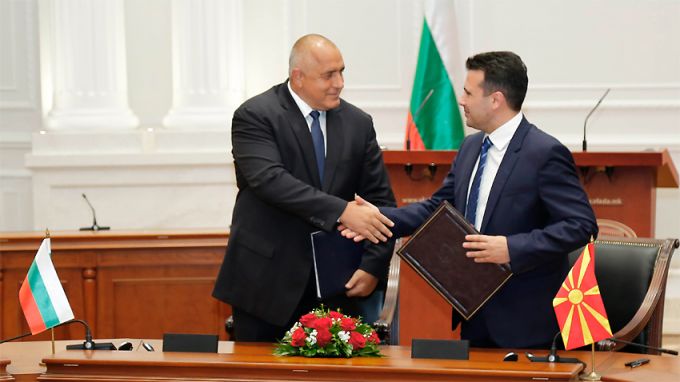
This week starts with more good news about the political relations between Bulgaria and Macedonia. After the signature of the good neighbor agreement the two countries have started discussions on bilateral cooperation in defense and Bulgaria’s Minister of Defense Krasimir Karakachanov and his Macedonian counterpart Radmila Shekerinska are negotiating in Skopje a joint exercise of the special forces of Bulgaria and Macedonia. The two countries are also discussing the updating of the agreement signed between the Ministries of Defense of Bulgaria and Macedonia in the remote 1999. However, the real change in the bilateral relations between Sofia and Skopje is yet to come and it will be made by the business, rather than by politics.
The Macedonia-Bulgaria Chamber of Commerce expects that after the signature of the good neighbor agreement the capital movements between Bulgaria and Macedonia will be alleviated. Bulgarian companies voiced serious intentions to invest in strategic sectors in Macedonia’s economy such as mining and power engineering. The two countries are also discussing possible customs and border alleviations related to transport and movement of people. According to Macedonia’s statistics, Bulgaria is that country’s fifth largest trade partner. Meanwhile, according to Bulgaria’s national statistics, Macedonia is among the six countries together with Turkey, Russia, China, Serbia and Egypt which form 51.1% of Bulgaria’s exports. Trade between Bulgaria and Macedonia has been improving, but is still far from its real potential. However, there are reasons for optimism, if political climate remains positive.
Two weeks after the signature of the Good Neighbor Relations Agreement between Bulgaria and Macedonia, Bulgaria’s government made in the middle of August amendments to its Transport and Transport Infrastructure Operational Programme which would allow the whole railway section between Sofia and the Bulgaria-Macedonia border (rather than the railway section between Radomir and Gyueshevo only) to be projected with EU funds. This is a very important step, because Sofia and Skopje started the construction of the abovementioned railway line at the end of the 19th century and it hasn’t been completed yet.
There is no gas interconnection between Bulgaria and Macedonia either, but at the beginning of August 2017 the two countries signed a memorandum of cooperation that will allow a joint working group to study the possibilities for construction of such gas link. The analysis will be ready by the beginning of 2018 and some changes in Bulgaria’s energy strategy can be expected as a result. Expectations in that sphere are also optimistic due to the fact that the gas interconnection between Bulgaria and Macedonia goes far beyond the bilateral dimensions and is part of a broader idea aimed at boosting energy connectivity between the countries in Southeast Europe.
However, the positive developments in the economic relations and cooperation between Bulgaria and Macedonia are still wishful thinking. Nearly three decades after the start of the democratic changes in Bulgaria and after Macedonia’s Declaration of Independence, the political relations between Sofia and Skopje finally look well-adjusted and now it is the turn of both countries to show real and pragmatic actions.
Movement for Rights and Freedoms - New Beginning Leader Delyan Peevski spoke with Prime Minister Rosen Zhelyazkov on Monday, the party's press centre reported. "I reaffirmed my position of full support for the government as long as it works for the..
EU roaming fees to be eliminated for Albania and Montenegro Roaming charges between Albania and the EU will be completely eliminated in 2026, European Commission President Ursula von der Leyen said during her visit to..
Bulgaria’s Parliament failed to hold a session for the third consecutive day due to a lack of quorum. As a result, the scheduled parliamentary control, usually held every Friday, was also cancelled. Only 29 MPs from We Continue the Change –..

+359 2 9336 661
